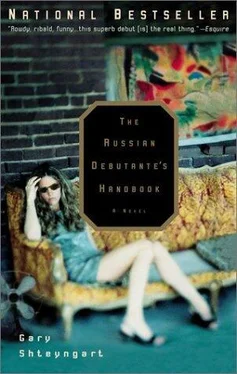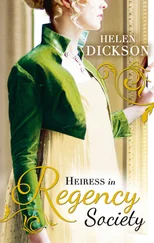Gary Shteyngart - The Russian Debutante's Handbook
Здесь есть возможность читать онлайн «Gary Shteyngart - The Russian Debutante's Handbook» весь текст электронной книги совершенно бесплатно (целиком полную версию без сокращений). В некоторых случаях можно слушать аудио, скачать через торрент в формате fb2 и присутствует краткое содержание. Город: New York, Год выпуска: 2003, ISBN: 2003, Издательство: Riverhead Books, Жанр: Современная проза, Юмористическая проза, на английском языке. Описание произведения, (предисловие) а так же отзывы посетителей доступны на портале библиотеки ЛибКат.
- Название:The Russian Debutante's Handbook
- Автор:
- Издательство:Riverhead Books
- Жанр:
- Год:2003
- Город:New York
- ISBN:0-7865-4177-6
- Рейтинг книги:4 / 5. Голосов: 1
-
Избранное:Добавить в избранное
- Отзывы:
-
Ваша оценка:
- 80
- 1
- 2
- 3
- 4
- 5
The Russian Debutante's Handbook: краткое содержание, описание и аннотация
Предлагаем к чтению аннотацию, описание, краткое содержание или предисловие (зависит от того, что написал сам автор книги «The Russian Debutante's Handbook»). Если вы не нашли необходимую информацию о книге — напишите в комментариях, мы постараемся отыскать её.
and
. The Russian Debutante’s Handbook Bursting with wit, humor, and rare insight,
is both a highly imaginative romp and a serious exploration of what it means to be an immigrant in America.
The Russian Debutante's Handbook — читать онлайн бесплатно полную книгу (весь текст) целиком
Ниже представлен текст книги, разбитый по страницам. Система сохранения места последней прочитанной страницы, позволяет с удобством читать онлайн бесплатно книгу «The Russian Debutante's Handbook», без необходимости каждый раз заново искать на чём Вы остановились. Поставьте закладку, и сможете в любой момент перейти на страницу, на которой закончили чтение.
Интервал:
Закладка:
The doctor turned on a fan, undressed, ate a conveniently placed piece of cheese, and put himself to bed. I will dream of the well-being of my son, he said to himself. But, alas, the dream would not come. There was something holding him back, an ugly impression from the little dinner party he had had with Vladimir. What was it? He had spoken of the great themes—the futility of love, the ephemeral nature of youth. But he had babbled on about nothing, really! All that verbosity, Russian melancholy, and nostalgia were for naught. As always, he had missed the point. He should have said… Let’s see. Well, to start, he should have told Vladimir that he was tired. Just in those words: “Vladimir, I am tired.” Yes that’s what he should have said. Dr. Girshkin yawned as if to emphasize his tiredness.
And why am I tired, Vladimir? Well, if you must ask, I will answer. I am tired because emigrating to this country, leaving one’s hut, one’s yurt, one’s Soviet-era high-rise requires an ambition, a madness, a stubbornness, a stamina that I have never had.
Ach. Dr. Girshkin rearranged his moist sheets and propped his pillow this way and that. No, that sounded too pathetic, too defeatist. Instead, he should have been more theoretical about the whole matter. “You see, Volodya,” he should have said, “the Old World is populated by two breeds of peasants, the alpha peasant and the beta peasant. Now the alpha peasant, she feels the dry soil crack beneath her feet and quickly packs her family’s bags for the New World, while the beta peasant, poor fellow with his weak, sentimental heart, stays put and tills the desperate land. Your mother? Well, as you might have guessed, she’s the alpha peasant of our family, a force unswerving, impenetrable, inexorable. Do you follow me, Volodya?
“Good! Because let me tell you this: Contrary to your mother’s refugee charter, it’s all right to be less than your neighbor, to be a beta immigrant here in America where alpha immigrants are the rule. It’s all right to let stronger people take responsibility for your life, to let them drag you to a better place, show you how it’s done. Because, ultimately, my son, making compromises may be a necessity, but it’s the constant weighing and reweighing of these compromises that becomes an illness.”
Dr. Girshkin quivered with happiness at his insight. “An illness.” Right! Or, perhaps, “a madness.” That was better still.
He thought of ways he could share this information with Vladimir—maybe he could tempt him back to Scarsdale with the promise of more money, or they could plan an excursion to the city’s famous Metropolitan Museum (their Near Eastern collections were quite impressive). Yes, a museum. The perfect location for imparting important lessons.
Dr. Girshkin finally drifted off to sleep, dreaming of father and son astride a winged Assyrian lion, soaring over the aerials and prickly spires of this unlovely land. The doctor couldn’t imagine where the ancient beast was taking them, but, in the end, after a long full day of suffering, it was nice to simply take to the air.
14. THE SEARCH FOR MONEY DOWNTOWN
THE NEXT MORNINGin Manhattan, Vladimir shook off the shackles of slumber, vigorously brushed his teeth, took a long cathartic shower, and counted the goods: he had $800.00 from his father plus the $500.00 from Rybakov plus the still unsold Rolex and ten thousand Dunhill cigarettes. “A good start,” Vladimir said to Francesca’s sleeping form, “but I resolve to do better.” And with that Gatsbyesque mantra on his lips, he set off once again for the jolly workaday world of the Emma Lazarus Society. He had barely made it through the reception area when Zbigniew, the Acculturation Czar, leapt out of the processing room and ambushed him. “Girshkin,” he said. “It’s here.”
“Good God! What’s here?”
“Your idiot countryman with the fan. Rybakov. His FOIA is here.”
“Foh-yah?”
“Freedom of Information Act. O moi boze! How long have you been working here, Girshkin?” Zbigniew grabbed his employee’s shirtsleeve and dragged him to his lair, the office of the chief acculturator. Here, Lech Wal ⁄esa waved to adoring dock workers from one wall, John Paul II smiled weakly from beneath his scepter, and taking center stage was the framed jacket cover of Zbigniew’s vanity-press masterpiece Pole to Pole: A Father & Son’s Journey to the Heart of Polonia.
“He got as far as the citizenship ceremony,” Zbigniew rasped happily, waving the government file at him. Vladimir had caught him right after lunch—the most satisfactory, almost postcoital part of the Acculturation Czar’s sad little day.
“That far.”
“Picture for yourself a little scenario. Rybakov is taking the oath, he is at the part where you have to swear to defend the country against all enemies foreign and domestic, and, well… I suppose he takes this the wrong way or, more likely, he is drunk, because he spontaneously starts beating Mr. Jamal Bin Rashid of Kew Gardens, Queens. Beats him with both his crutches, it says here, while shouting racial no-nos.”
“I see.”
“Mr. Rashid is talked out of pressing charges, but—”
“The citizenship.”
“Yes.”
“Well, can’t we do something?” said Vladimir. “I mean the man is a documented loon, surely there are exceptions for the mentally ill.”
“What can we do for him? We could put him in a home where he won’t hurt anybody. We can close down the visa section in Moscow so you Russian bastards stay home.”
Yes, of course. “Thank you, Pan Direktor, ” Vladimir said, retreating to the unkempt comfort of his own desk. He rested his head against the desk’s cool and unforgiving metal. This wasn’t good news at all.
He had wanted Rybakov to get his citizenship.
He had wanted more goods and services out of the Georgians.
He had wanted to visit the Groundhog in Prava to extract some gifts from him personally.
At least there was the nightly dinner with the Ruoccos. Was it bouillabaisse night already? Wait, let’s see…Monday—polenta, Tuesday—gnocchi… What came after Tuesday? According to the appointment book, a night with an anachronistic buffoon. A former best friend.
YES, IT WASBaobab Night. After ignoring Baobab’s phone calls for nearly two months, Vladimir felt an ache in his heart, a subtle reminder of his tonkost, the Russian word signifying empathy, quiet compassion, a generosity of spirit.
No, that’s not true. It was the money, of course. Bao had ways of making it, desperate ways.
The Carcass was celebrating its Modern Music Week. On this particular outing, the band and its audience had bridged the gap between artist and patron: both were dressed in accordance with the same flannel-and-boots look that was starting to seep out of the nation’s unplugged Northwestern corner. Seattle. Portland, Oregon. Something or someone named Eugene. This was a worrisome development for Vladimir who did not want to wear flannels or boots, certainly not in the summer. He tugged nervously at his ample Cuban shirt. He would have to discuss this with Fran.
Meanwhile, Baobab was giving life to the “grinning from ear to ear” cliché; his entire face, even the thick nose bent at several junctures, was somehow caught up in the act of smiling. The sad thing was that it was Vladimir (just standing there drinking his beer) who provoked all this mirth in lonely Baobab.
Vladimir was reminded of their high school days: Vladimir and Baobab taking the Metro-North Railroad home from the math-and-science high school after a long day of subtle rejections by young women and men alike, discussing better ways to lodge their suburban selves into Manhattan’s starry firmament. Wasn’t this the same Baobab he once loved?
Читать дальшеИнтервал:
Закладка:
Похожие книги на «The Russian Debutante's Handbook»
Представляем Вашему вниманию похожие книги на «The Russian Debutante's Handbook» списком для выбора. Мы отобрали схожую по названию и смыслу литературу в надежде предоставить читателям больше вариантов отыскать новые, интересные, ещё непрочитанные произведения.
Обсуждение, отзывы о книге «The Russian Debutante's Handbook» и просто собственные мнения читателей. Оставьте ваши комментарии, напишите, что Вы думаете о произведении, его смысле или главных героях. Укажите что конкретно понравилось, а что нет, и почему Вы так считаете.












